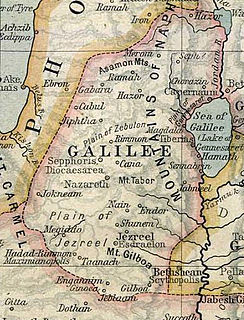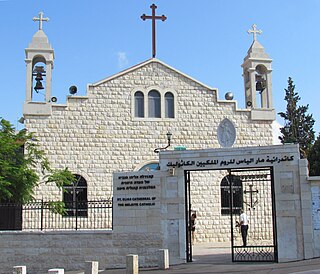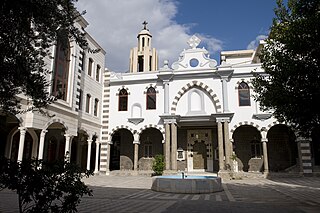
Anazarbus was an ancient Cilician city. Under the late Roman Empire, it was the capital of Cilicia Secunda. Roman emperor Justinian I rebuilt the city in 527 after a strong earthquake hit it. It was destroyed in 1374 by the forces of Mamluk Empire, after their conquest of Armenia.

The Melkite Catholic Patriarchate of Antioch is the only actual residential Patriarchate of the Melkite Greek Catholic Church. It was formed in 1724 when a portion of the Orthodox Church of Antioch went into communion with Rome, becoming an Eastern Catholic Church, while the rest of the ancient Patriarchate continues in full communion with the rest of the Eastern Orthodox Church.
The Armenian Catholic Eparchy of Kharput was a modern eparchy and remains a titular see of the Armenian Catholic Church (sui iuris.
Ignatius Bedros XVI Batanian was Armenian Catholic Catholicos-Patriarch of Cilicia from 1962 until his resignation in 1976. His election came as replacement of cardinal patriarch Gregory-Petros XV Agagianian, who had been assigned responsibilities with the Roman Catholic Church at the Vatican.

Ptolemais was an ancient port city on the Canaanite coast in Palestine region. It was also called Ptolemais in Canaan (or Akko, Ake, or Akre in Canaanite Language. It was an Ancient bishopric, which became a double Catholic titular see.

Melkite Greek Catholic Archeparchy of Akka is an Eastern Catholic diocese of Melkite Greek Catholic Church, directly subject to the Melkite Patriarch of Antioch. Its Cathedral episcopal see is St. Elijah Greek-Melkite Cathedral, in Haifa.
Melkite Greek Catholic Archeparchy of Homs is a nominally Metropolitan Archeparchy of the Melkite Greek Catholic Church in central Syria. It was established on March 4, 1849 and has no suffragan, but two merged-in eparchial titles.
The Syriac Catholic Archeparchy of Mosul is a Syriac Catholic Church ecclesiastical territory or archeparchy in northern Iraq. It is not a metropolitan see and is immediately exempt to the Syriac Catholic Patriarch of Antioch and the Roman Congregation for the Oriental Churches, and not part of any ecclesiastical province. Its cathedral is the Syriac Catholic Cathedral in the episcopal see of Mosul.
The Armenian Catholic Archeparchy of Baghdad is a non-metropolitan Archeparchy of the Armenian Catholic Church, covering Iraq.
The Armenian Catholic Patriarchal Exarchate of Jerusalem and Amman is the missionary pre-diocesan jurisdiction of the Armenian Catholic Church sui iuris in the Holy Land (Palestine/Israel) and (Trans)Jordan.
The Syriac Catholic Archeparchy of Aleppo is a Syriac Catholic Church ecclesiastical territory or archeparchy of the Catholic Church in Syria. The Archeparchy of Aleppo is not a metropolitan see and is exemption directly to the Syriac Catholic Patriarch of Antioch.

The Armenian Catholic Eparchy of Alexandria is a suffragan eparchy of the Armenian Catholic Church sui iuris, in the Patriarch's own 'ecclesiastical province of Cilicia', covering Egypt and Sudan.
The Armenian Catholic Eparchy of Qamishli is a suffragan eparchy of the Armenian Catholic Church sui iuris in the Patriarch's own ecclesiastical province 'of Cilicia', serving part of Syria.
The Armenian Catholic Archeparchy of Aleppo is a non-Metropolitan Archeparchy of the Armenian Catholic Church sui iuris in part of Syria.
The Syriac Catholic Archeparchy of Homs(-Hama-Nabk) is a nominally Metropolitan Archeparchy of the Syriac Catholic Church sui iuris, without suffragans, in part of Syria.

The Syriac Catholic Archeparchy of Damascus is a Syriac Catholic Church ecclesiastical territory or eparchy of the Catholic Church in Syria. While a metropolitan see, the Archeparchy of Damascus is without suffragans and is exempt directly to the Syriac Catholic Patriarchate of Antioch. It has its cathedral in the archepiscopal see and Syrian national capital Damascus.
Colonia or Koloneia, also called Colonia in Armenia to distinguish it from other towns of the same name, was a town of ancient Lesser Armenia, inhabited during Hellenistic, Roman, and Byzantine times. It became important enough to be the seat of a bishop, a suffragan in the Late Roman Province of Armenia Prima, but faded like most in Asia Minor. No longer a residential bishopric, it remains, under the name Colonia in Armenia, a titular see of the Roman Catholic Church.
The Syriac Catholic Archeparchy of Baghdad is a Syriac Catholic Church ecclesiastical territory or archeparchy of the Catholic Church in Iraq. It is not a metropolitan see and is directly exempt to the Syriac Catholic Patriarch of Antioch, though not part of his or any other ecclesiastical province, and in Rome depends on the Congregation for the Oriental Churches.
Catholic dioceses in the Holy Land and Cyprus is a multi-rite, international episcopate in Israel and Cyprus.






